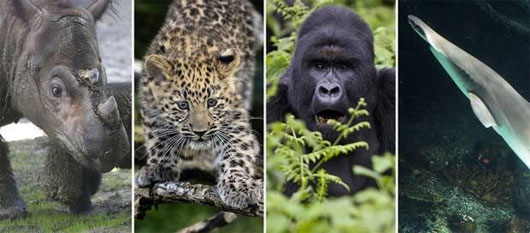Perspective of mass extinction like dinosaurs
The world is precarious in the brink of mass extinction, and humans have accelerated the disappearance of organisms by 10,000 times.
>>>Australian volcano caused the first extinction in history
While the earth faces the sixth scenario of mass extinction , mankind is responsible for accelerating the extinction of animals and plants. According to Phys.Org, a report by Duke University experts, the species are disappearing at a rate 10 times faster than expected, while the rate of extinction before humans appear more slowly. a lot of. 'We are on the verge of the next mass extinction, and whether it is avoided or not is based on human actions , ' said study leader Stuart Pimm.

The species may soon disappear without intervention - (Photo: Huffington Post)
Judged as a landmark report, Duke University research focused on calculating the 'death rate' of species leading to extinction among the 1 million species on the surface of the globe. The latest analysis results show that the pre-human extinction rate was at 0.1 / 1 million, not 1/1/1 million as reported in 1995, also by Dr. Pimm in charge. perform. Meanwhile, the extinction rate is now at least 1,000 times faster than the number of 0.1, not only that can be up to 1,000 / 1 million. Although there are many different factors that influence the process of accelerating the disappearance of organisms, the biggest factor is losing the habitat that culprits no one else is human, according to Dr. Pimm and co-workers. Imitation Clinton Jenkins of the Institute of Ecological Studies in Brazil.
Other key actors contribute to accelerating the disappearance of species in the world including: the invasion wave of alien creatures following the migration of people to new lands and destroying communities native flora and fauna; climate change affects species' habitats; and consequences from excessive fishing . A typical example is a squirrel-tailed macaque in Brazil, now pushed into the bottom line as development in the country has destroyed their habitat, while another species of squirrel-tailed macaque encroached on little remains. White-fin sharks have been one of the most crowded predators on Earth, but they are so hunted that they are now virtually absent on ocean surfaces, according to marine biologist Boris. Worm of Dalhousie University (Canada). 'If we don't intervene, the world will face the risk of mass extinction as it happened with dinosaurs,' Professor Worm said.
Among the most likely species will disappear completely with Sumatra rhino, Amur snow leopard and mountain chimpanzee. However, Dr. Pimm and Jenkins experts suggest that there is still little hope to salvage, such as being able to take advantage of smartphone use habits and applications such as iNaturalist to ask civilians and homes. Biologically promptly informed when a species of animals is about to be in danger. When it comes to information, experts can attempt to restore the situation by maintaining a habitat and applying breeding methods and other means to save animals that may become extinct.
There have been species that have been saved in this way, that is the golden lion squirrel monkey. A few decades ago, the small primates were once thought to be extinct because their habitats were wiped out. However, scientists later discovered them in the most remote areas of Brazil and carried out protective measures, while seeking new places for them. The golden lion-tailed macaque community is now reproducing and escaping the doomed fate.
- Bacteria and salt lake help dinosaurs hegemony
- Earth prospect when dinosaurs existed to modern times
- Looking for the cause of extinction of dinosaurs
- How dinosaurs dominate Earth? That era begins with the Great Extinction
- Dark matter is the cause of dinosaurs extinction?
- This is Earth's worst mass extinction disaster
- Meteorites make dinosaurs extinct
- Life of dinosaurs so far without extinction
- Global warming climate has caused 2 historical disasters of extinction
- Dinosaurs are extinct because of cold
- Dinosaurs extinction is caused by meteors?
- What if dinosaurs live with humans?
 Animal 'suffering' after hibernation
Animal 'suffering' after hibernation Why do goats climb well?
Why do goats climb well? Scientists were surprised to see chimpanzees eating turtles
Scientists were surprised to see chimpanzees eating turtles Giant catfish died deadly due to drought in Thailand
Giant catfish died deadly due to drought in Thailand